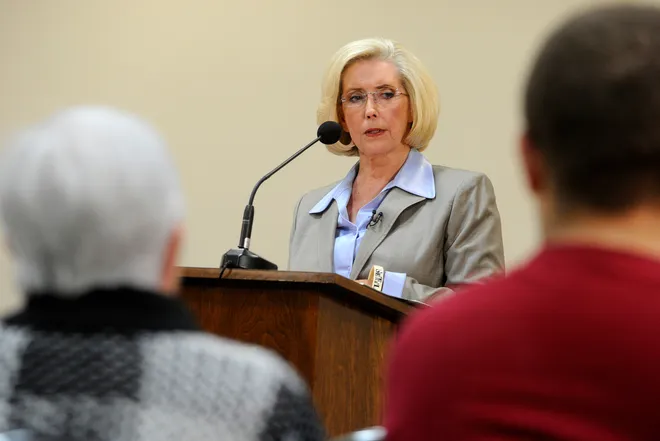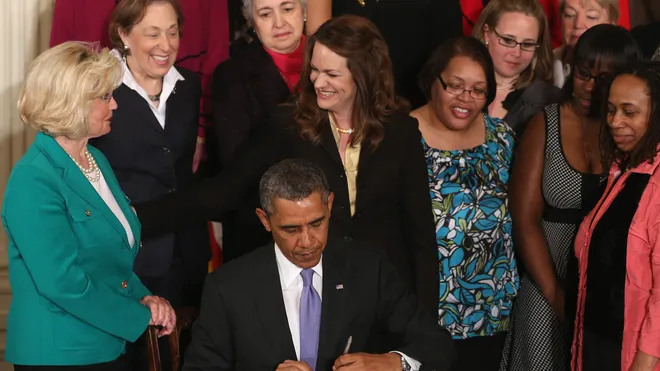Lilly Ledbetter, equal pay trailblazer who changed US law, dies at 86
GADSDEN, Ala. — Lilly Ledbetter, a women's equality activist whose sex discrimination lawsuit against her employer culminated in a major equal wage legislation bearing her name, has died. She was 86.
Ledbetter, who was born and raised in Alabama, died of respiratory failure on Saturday, her family said in a statement on Sunday, CNN reported. "She was surrounded by her family and loved ones. Our mother lived an extraordinary life," the statement said.
Ledbetter was employed at the Goodyear Tire & Rubber plant in Gadsden, Alabama, in 1979, starting at the same pay scale as male workers. Over a 19-year career with the company, she rose to a salaried, supervisory role.
But in 1998, as she neared retirement, she received an anonymous tip that male supervisors at the plant were making significantly higher salaries than her — as much as 40% more. She said later that she did not know the situation until that tip.
Ledbetter first filed a complaint against Goodyear with the Equal Opportunity Commission, then sued the company alleging wage discrimination under Title VII of the Civil Rights Act of 1964 and the Equal Pay Act of 1963.
"After nearly two decades of hard, proud work, I found out that I was making significantly less money than the men who were doing the same work as me," Ledbetter recalled in a speech during the 2012 Democratic National Convention in Charlotte, North Carolina. "I went home, talked to my husband and we decided to fight."
A jury found in her favor on the Civil Rights Act claim, awarding her more than $3.5 million in back pay, punitive damages, and damages for mental anguish. The amount was subsequently reduced to $360,000, the statutory maximum in such cases.
But the 11th Circuit Court of Appeals in 2005, and the U.S. Supreme Court in a 5-4 ruling two years later, overturned the verdict and the jury’s award, ruling that any legal challenge had to come within 180 days of the initial discriminatory action.
Congress plugged that loophole two years later, passing the Lilly Ledbetter Fair Pay Act, which extended the statute of limitations for an equal-pay lawsuit to 180 days every time a discriminatory paycheck is issued.

U.S. leaders, activists pay tribute to Lilly Ledbetter
The Lilly Ledbetter Fair Pay Act was the first bill signed by President Barack Obama in January 2009, in which Ledbetter was on hand for the ceremony.
"Lilly Ledbetter never set out to be a trailblazer or a household name," Obama said in a statement on social media Sunday. "She just wanted to be paid the same as a man for her hard work. But this grandmother from Alabama kept on fighting until the day I signed the Lilly Ledbetter Fair Pay Act into law — my first as president.
"Lilly did what so many Americans before her have done: setting her sights high for herself and even higher for her children and grandchildren," the former president said. "Michelle and I are grateful for her advocacy and her friendship, and we send our love and prayers to her family and everyone who is continuing the fight that she began."
Other U.S. leaders, including Senate Majority Leader Chuck Schumer, former Secretary of State Hillary Clinton, and former House Speaker Nancy Pelosi paid tribute to Ledbetter on social media. In separate statements Monday, both President Joe Biden and Vice President Kamala Harris pledged to "remain committed to building on Lilly’s legacy and to strengthening equal pay protections for all workers."
"Before she was a household name, Lilly was like so many other women in the workforce: she worked hard, with dignity, only to find out she was being paid less than a man for the same work," Biden said.
Equal Pay Act passed over 60 years ago.So, why do women still make less than men?
Union leaders and women's rights advocates honored Ledbetter and paid their respects on social media. Liz Shuler, president of the American Federation of Labor and Congress of Industrial Organizations (AFL-CIO), described Ledbetter as a "trailblazer and a champion for equity and fairness."
Noreen Farrell, executive director of Equal Rights Advocates, said on X that Ledbetter "inspired new laws and a generation fighting to ensure wage justice for all."
Fatima Goss Graves, president and CEO of the National Women’s Law Center, underscored Ledbetter's fight for equal pay throughout her life.
"Even into her 80’s, Lilly never hesitated to hop on planes to speak to women across the country about why they must actively fight for wage equality. In her last NPR interview in January 2024, Lilly described her wish that she would live long enough to see the end of the wage gap," Graves said in a statement. "Lilly Ledbetter became the beloved face of equal pay, and the National Women’s Law Center will continue fighting for women to be valued at their jobs—knowing that one day Lilly’s dream of equal pay for all will become a reality.”

'Her story continues to inspire us all'
Ledbetter released a memoir in 2012, “Grace and Grit: My Fight for Equal Pay and Fairness at Goodyear and Beyond,” telling The Gadsen Times, part of the USA TODAY Network, in a 2011 interview that it was to ensure “future generations” would “know what the history is.”
She continued advocating for wage equality throughout her life, telling The Times in 2011 that “it’s the right thing to do and that’s who I am.”
Ledbetter was inducted into the National Women’s Hall of Fame in Seneca Falls, New York, in 2011. She recently received Advertising Week’s Future Is Female Lifetime Achievement Award, and “Lilly,” a film about her case with Patricia Clarkson in the title role, premiered last week.
The team behind the film said in a statement Sunday that they were "deeply saddened" by Ledbetter's passing.
"We were immensely inspired by her and countless women and workers around the world have been too. Lilly’s legacy is one of courage and resilience; she recognized an injustice and fought bravely to correct it," the "Lilly" film team said. "Her impact has and continues to reverberate around the country and the world. Lilly is an ordinary woman who achieved extraordinary things, and her story continues to inspire us all."
Disclaimer: The copyright of this article belongs to the original author. Reposting this article is solely for the purpose of information dissemination and does not constitute any investment advice. If there is any infringement, please contact us immediately. We will make corrections or deletions as necessary. Thank you.







